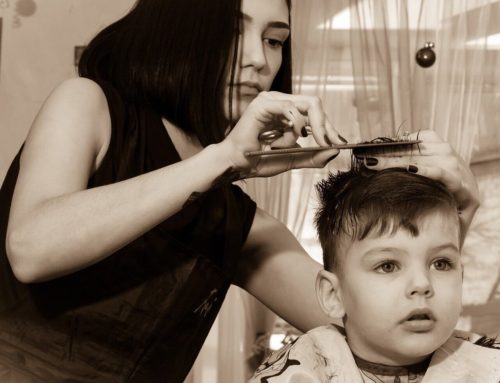I like a clean house, and I love to organize things. But, like most people, I don’t enjoy the actual cleaning part. So I’ve always tried to figure out how to clean in the most efficient way possible, with the least amount of work. This comes naturally to me—organizing both my time and my spaces.
As you can imagine, this drive for cleanliness can make me a little too uptight. If my house starts to get to a certain mess level, I can’t ignore it. Some people can have a much messier house and still be calm. That can be an advantage too. But I get anxious if my house starts to get cluttered. I can’t focus on anything else until it’s clean.
When kids came along, keeping a clean house obviously got a lot harder. And with my first daughter my expectations were way too high. As soon as she turned three, I started trying to get her to clean. It didn’t work out. I’d get frustrated when she wouldn’t or couldn’t clean up after herself, and we started butting heads.
That’s when I realized—she was three. I had to expect less of her. If I wanted her to clean or obey, I had to work with her and teach her to do things in an age-appropriate way. I adopted a new mantra that has served me well while raising all four of my daughters: “Kind and calm.” I’ve repeated that motto to myself so many times it’s deeply ingrained in how both how I parent in general and how I teach my kids to keep the house clean.
Now that three-year-old is married with a house of her own—which she keeps very tidy. My second is heading to college and I’ll have just two teenage daughters at home.
One of the biggest things I’ve learned over the years is that teaching kids to clean and be tidy is more about “parent training” than “kid training.” It takes a lot of work to ingrain the habits and skills kids need to be able to keep the house clean and tidy. Here are some of the things I’ve learned along the way:
Chores for Children 3-8
Eventually, I learned to have pretty low expectations for cleaning skills for kids younger than eight. Their efforts are about the process rather than the product. Until age eight, my strategy for teaching my them to clean is to encourage them and make cleaning fun, with low expectations for the actual quality of the work. The goal is to let them practice working and get in the habit of helping.
At about age three, I started having them help with basic chores, like unloading the dishwasher. When they couldn’t reach up high to put things away, I’d have them stack the dishes on the counter, sorted by type of dish, so it was easier for me to put them away. Their daily morning “chores” included getting dressed and brushing their hair and teeth, as well as making their bed (to their ability).
Chores for Children 8-12
It’s hard to wait until children are eight to have them really start doing chores, but that really is the “age of accountability.” That is when children start to understand and care about right and wrong and when they have the cognitive and physical abilities to be helpful and responsible.
Once my daughters turned eight, I started a little more of a regimented routine. I expected them to take turns cleaning bathrooms, vacuuming, and dusting. That’s also when they joined the rotation for kitchen duty.
In our family, we’ve always rotated nights for kitchen duty. We all take our plates over and rinse them, but the person on kitchen duty loads the dishwasher, washes the pans, and wipes the table and counters.
When the girls first turned eight, we cleaned with them, to teach them how to do it, and then we slowly backed off and let them do it themselves. Sometimes we’d go back and polish it up after the designated cleaner was in bed, but we tried not to be too picky about the quality of cleaning while they were still learning.
I also created index card that list exactly how to clean the kitchen or bathroom, and post them in those rooms, so they know how to do it without me hovering. They have steps to follow and they just do it.
Chores for Teenagers
As our children’s abilities have changed over time, so have their responsibilities. We like to reassess every fall, before school starts, and create a new chore schedule, taking into consideration the children’s increasing abilities but also their school workload and activity schedule. Then we write out a schedule for both the daily and weekly expectations.
We present the new system at a family meeting and listen to any feedback they might have. This new schedule for the school year can also include assigned days for helping with dinner preparation and instrument practicing schedules.
For our children, middle school and high school started much earlier than elementary, so when the kids reach that age they don’t have morning chores anymore (besides getting themselves ready), but they still rotate doing the dinner dishes and Saturday chores.
Extra Chores
Once we established good habits, the regular daily and weekly chores have gone pretty smoothly. But when there are extra chores, we still get resistance. My husband and I joke that our kids think they’re part of a union. They’ll go on strike if you ask them to do something that’s not in their original contract.
When I decide the house needs some deep cleaning, I try to warn the kids that it’s coming up, and give them a pep talk reminding them that when everyone helps the work is more enjoyable and it goes faster. We talk about how nice the house will look when it’s all clean. Sometimes I assign the chores, and sometimes we write them on slips of paper and choose out of a jar. Another way is to tell them the options and let them choose, but this can lead to arguments between the children, so you have to be careful.
In the summer we stick to the same daily and weekly chore schedule, but we add on some extra responsibilities. Kids have more free time in the summer, and it’s a great time to teach extra skills such as laundry or sweeping and mopping the kitchen floor. This is also a good time to pick a few days for all family members to help with deep cleaning the house. Again, I present the new chores and schedule to the kids at the beginning of summer. The particulars of the system aren’t as important as sticking to it and requiring all children to work.
Another thing I like to do in the summer is to assign a “special helper” each week. That daughter helps me deep clean the kitchen, do the laundry, grocery shop, and plan and prepare the meals. It has worked really well because it’s easy to remember who to call on for help, it’s fun to spend time with that daughter during the week, and she enjoys the extra attention. I teach her specific things about how to do all the chores, and it makes life easier for me.
Teach Tidiness
Overall, we’re able to keep a pretty simple chore routine, because from an early age, my kids know that we’re always cleaning as we go. This is what I’m talking about when I say that teaching kids to be clean is really parent-training more than kid training.
At least at first, it is the parent who has to remember to enforce tidiness on a regular basis. So when your child is finishing a meal, before she runs off you have to remember to say, “Take your plate over to the sink,” or “Don’t forget to wash your dishes and load them in the dishwasher,” or whatever task you expect them to do.
Similarly, you have to catch them before they leave an activity (like LEGOs or Polly Pockets) and tell them to clean it up before they go on to the next activity. And if they’ve already moved on, you have to have the emotional energy and fortitude to call them back, deal with their gripes, and get them to do it.
I also teach them little habits of cleaning up after themselves, like brushing crumbs from the countertop into their hand after they make toast, or scrubbing the toothpaste in the sink with their fingers after brushing their teeth.
Teach Prevention
I also really focus on trying to prevent messes before they happen. Obviously, the less mess you make the less time you spend cleaning up later. So when I became a parent I quickly realized that if we could avoid making messes then we could avoid having to clean them up!
For example, when my kids were first learning to feed themselves, I’d sit with them and help them learn to do it neatly, instead of just letting them go to town and throw food everywhere. As they got older, I continued to teach them to eat as cleanly as possible, so I don’t have to wash their clothes every day.
There is a downside to this philosophy of prevention—at times I’ve gotten too irritable or critical of my kids when they make dirty messes. One part of my mind knows that kids need to make messes to explore and learn, but the other part can’t stand the clean up and so I prohibit those activities.
Clean Bedrooms Together
All four of my girls are good at keeping common areas clean, and they do their chores willingly. But it’s in their rooms that you see the differences. Some of them are super organized and clean and like their rooms to be clean, and others amaze me how dirty it can be. There’ll be crackers and food in there, even though they’re not supposed to bring food up there.
Surprisingly, though, I’m not very regimented about cleaning bedrooms. I just kind of notice when their bedrooms are getting messy and then make a mental note to remind them about it the next Saturday. I’m really hands-on with helping my girls clean their rooms until about age 10-12, depending on the child, and then I back off a little, but I still can’t let it get too bad.
I like to clean their bedrooms with them. For me it’s a positive time to be together. Sometimes they complain, but I think they like to get it clean, too. Children are social creatures. They don’t want to work by themselves, and we all know they get distracted when they are working alone. Most children work better with someone by their side.
Motivating Kids
I don’t want chores to become a negotiation ground. So when I need a child to do something, I just say, “You need to do it, even though I know you don’t want to.” Then I try to make it more pleasant, like suggesting they listen to music, or if they’re tired, give them the option of resting for a few minutes first—some compromise where they feel like they’re getting something out of it.
If it’s a hard night and they’re really struggling, we just clean with them. Another technique I really like is to say, “Why don’t you set the timer and just work for 10 minutes, and whatever you don’t get done, I’ll finish.” They realize they can get a lot done in 10 minutes, and sometimes they get into the groove and just keep going.
Children, especially between the years of 2-5, are willful and defiant; they are working out that separation between their parents and themselves. They test boundaries – it’s as if they are saying, “Clean my room – or what?!” If you approach this the wrong way, you are faced with enforcing stricter and stricter consequences (punishments) for not obeying. I don’t really use punishments or elaborate consequences when my kids make a mess; I just simply say, “You need to come back and clean up.”
For young children, I like to give small, simple tasks that will be manageable for their age, and then let give them choices, so they feel like they have some control. For example, “Would you like to do Barbies or books?” They clean up whichever category of toy they choose, and then you give them another choice. It also makes the job seem easier because they don’t have to think about the whole room at once. Don’t overdo the choices, though. Two is really enough; more can be overwhelming.
I also try to motivate kids to clean by being creative and fun. I’ll tell them to pick up all the blue toys (or ask them if they want to do blue or yellow toys), or have them pick up ten items and put them away. If stuffed animals need to go into a toy box or bucket, make “baskets” and give two points for each shot (sneak some math in, also!). If they like a certain character, have them pretend to be that character (say, Superman) and show you how fast Superman could clean up the blocks. Sometimes I would tell my kids we were pretending to be the Clean Up Fairies, and when we were done the real us would come in and be amazed at the clean room and wonder who did it! (I also do this to encourage “secret service” to other family members: pretend you’re the Clean Up Fairy and do your sister’s chore, then she will be happily surprised and want to know who did it!).
Another fun and creative way to motivate kids to clean is called Five and Five. Carry a timer with you and set it for five minutes. That’s how long you all work on cleaning the room (you can give the choices and direct as needed while cleaning). When the timer goes off everyone stops and does something fun together – maybe read a book, play blocks, rough-house – until the next five-minute timer goes off. Then you go back to cleaning. My kids loved this method, but it was so hard for me! Once we got into cleaning, I just wanted to finish. It killed me to stop and do something else.
And sometimes you just have to find the right time for your child to be motivated. This varies by child. Is your child more cooperative in the morning or in the evening? Maybe it’s best to wait until after he’s eaten a meal. Timing can make a big difference in how helpful your child is. If you’re trying to get a room clean and getting a lot of resistance from the child, maybe leave the mess (which is hard, I know!) and try again later. If you can find the time of day he’s most compliant, try to assign chores during that time on a consistent basis.
Whatever you do, don’t force children to clean. You won’t win. Some days your children will be cooperative, other days not so much. Encourage them to do at least something, such as pick up five toys. But if it’s not going well, it’s best to do it yourself or leave it for another time. There’s no benefit to having a battle about cleaning up. Don’t fret about your children not learning to be clean or responsible. View your children’s abilities to clean with a long-term perspective. Don’t overreact to one day’s failures. Just let it go and hope for a better day tomorrow.
Model a Positive Attitude
Above all, I don’t want my children to have a negative association with work. They’ll be cleaning up after themselves their whole lives—I don’t want them to dread it. So I try to have a positive attitude about work myself. For example I say “We get to clean” instead of “We have to clean.”
Act like you enjoy it, talk about how nice it will look when things are put away and how your child will be able to find things. Have a good attitude about your own cleaning chores. When you’re done cleaning a room, comment to your children on how great it looks and how nice it feels to have a clean space. Your example will have a great effect on their cleaning behavior.
I also don’t want to be critical when they don’t do a good job. I try to find something they did well and compliment them first, and then I help them fix whatever needs touching up. Sometimes I just resist the urge to correct altogether if I can see they tried their best, and just make a note to teach them the next time.
When my kids were little, I tried to make a big deal whenever my little child would put something away (it was a rare occurrence, but I kept a look out). If she started putting toys in a toy bucket or socks in a drawer I would say, “Yay! You’re putting them in! I like it when you put the toys in!” I did not show as much excitement when she took things out.
The Payoff
The good news is that if you put in the effort to teach your children to work hard and be responsible from the time they are young, it will pay off. Your life will be much easier! The other day I had to vacuum some rooms because my daughter was sick and couldn’t do her chores. It occurred to me that I almost never vacuum! I also rarely do the dinner dishes. My children are old enough now that they are able to take turns doing them every night.
I am very thankful that we have been consistent in requiring our children to help out at home—and my children are too! My oldest daughter is now married and running her own household and feels confident and capable.
If keeping a clean house does not come naturally for you, don’t despair. Maybe a few of these tips will spark something you can do to make it a little easier. I’m such a believer in embracing the kind of mother you are. Your strengths are good for them, but even your weaknesses are fine too. They need to learn that everyone has strengths and weaknesses.
Lisa Hoelzer is a wife and mother of four girls. She shares her wise and compassionate parenting advice at at betterwayparenting.net.







Leave A Comment